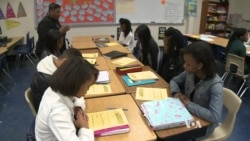Math is a big part of American education, but all too often, teaching kids to use that math for planning a budget or managing their own money isn't in the curriculum.
But a financial literacy program offered at Charles H. Flowers High School in Upper Marlboro, Maryland, is designed to give young people money skills that will last a lifetime.
The program was introduced three years ago by workplace readiness instructor Camilla Pea, who still teaches the course.
“Many students choose to take this class because they see understanding about financial literacy can change their future,” she said.
One of the most important lessons taught is how to save money.
“Many of our kids come from the middle-class families," Pea said, "so their families have [money]. ... They wear designer shirts, they wear designer shoes. They're in trends. So I’m trying to get them to understand, 'This is what your parents have. How are you going to attain your wealth?' "
Pea said teaching money management to teenagers calls for a creative approach.
“This is an adult concept," she said. "So sometimes you need to pull them in a little bit more. They don’t want anyone to stand in front of them and lecture them for an hour and a half. They want something that’s relatable. If they don’t see the connection, you lost them.”
Student Chialuka Odukwe has never lost interest in the topic. She said Pea inspired her to take saving seriously.
“She taught us about saving," Odukwe said, so "you will know what you’re doing when you’re older, when you’re out of college. I actually talked to my parents recently about starting a CD [certificate of deposit] account. So you can save money, like, every month, and over a couple of years it gets interest and stuff.”
Thinking about the future
Kids in the class also learn how to set priorities and make better financial decisions. Pea said she's trying to get the students "to make choices about later, not so much about now. That’s difficult, because they see ‘now,’ they don’t really see the path of ‘later.’ ”
Student Abiola Bakare took that lesson to heart. He became more aware of the value of money.
“I have a brother and a sister," he said. "My mom always pays for our stuff. And my mom says I’m the most expensive. She always tells me, ‘You have to calm down with your spending and everything.' Actually, now I realize I have to have budget and try to figure what I can spend on now and what I can spend on later.”
Bakare said his short-term goal "is to make enough money just to keep with me in case I need it for emergency or anything. My long-term goal is probably to buy a car, a used car so I can drive around and don't have to bother my parents with drive me everywhere I need to go.”
Pea teaches her students about the financial mistakes many adults make, mistakes that can send them into debt — like not balancing their checkbooks so they don't know how much money they have, or paying only the minimum due on their credit cards and letting the balance build up. Most of her students now are able to recognize and avoid those bad spending habits.
“Teenagers like to be in fashion," Odukwe said. "So they tend to spend a lot on stuff they only use for a week, and then it’s out of style.”
Bakare agreed, recalling, “I made this mistake before. I made some money, and instead of starting to save it for the future, I spent it on some shoes and some clothes, which was a very terrible mistake.”
Honor for teacher
Last year, Pea was named Personal Finance Educator of the year by the Greater Washington Chapter of Jump$tart, a nonprofit that promotes financial literacy.
Moji Silva, an assistant principal at the school, said Pea's class is an important part of the school's effort to help students develop practical life skills.
“We realized that if a student leaves high school and does not know how to balance a checkbook, does not know how to budget money, does not know how to get loans and weigh things out, which way to go, they will end up bankrupt even after college,” she said.
Silva said the class has become very popular among parents, too.
"One particular parent said, ‘In my days, we didn’t have anything like this. I didn’t know how to write a check until I was in college,' ” she said.
As part of the class, Pea encourages parents to talk to their kids about money and encourages kids to ask questions.
She said kids are told to "ask your parents: How much do you make? How you pay bills? How much is the electric bill? How much the gas costs? How much the food costs? When they go shopping, parents can start talking to kids about taxes, sales taxes.”
With such conversations, Pea said, financial literacy becomes a part of everyday life.









